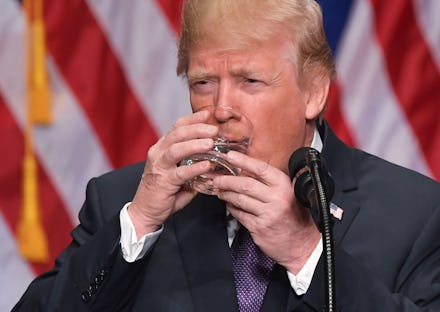Donald Trump doesn’t drink — and his sobriety should impact Kavanaugh’s nomination

Donald Trump is one of America’s few dry presidents. Trump has all but committed to a life of sobriety, and when it comes to beverages, he sticks to Diet Coke. Trump lost his older brother, Fred Jr., to alcoholism in 1981, and felt a “tremendous impact” by the loss. Fred was just 43 when he passed. In a 2015 interview with People, Trump said his brother would tell him, “‘Don’t drink ever.’ He understood the problem that he had and that it was a very hard problem,” Trump said.
The national discussion around beer, consent and high school behavior surrounding Judge Brett Kavanaugh’s hearings has Trump publicly talking about alcohol again. But this time, he’s seemingly overlooking its impact. The president’s relationship with alcohol makes his continued support for Kavanaugh, a man who strongly enjoys drinking beer, confusing. At Thursday’s hearing, Kavanaugh used the word “beer” 29 times — most memorably stating, “Yes, we drank beer. I liked beer. Still like beer. We drank beer.”
The president’s relationship with alcohol makes his continued support for Kavanaugh, a man who strongly endorses beer, confusing.
During a press conference on Monday, Trump said that he’d watched the hearings. “I was surprised how vocal he was about the fact that he likes beer, and he’s had a little bit of difficulty,” Trump said. “He talked about things that happened when he drank, I mean — this is not a man who said he is perfect with respect to alcohol.”
Trump called Kavanaugh’s testimony “powerful, honest and riveting,” but he didn’t get the facts straight. At the press conference, Trump mischaracterized Kavanaugh’s own description of his relationship with alcohol. The judge never mentioned difficulty with it, nor did he bring up his imperfection with respect to alcohol. In fact, Kavanaugh claimed that he never blacked out during a night of drinking, though former classmates have disagreed.
Charles Ludington, a former Yale classmate of the judge, described Kavanaugh as a “frequent drinker, and a heavy drinker,” who “was often belligerent and aggressive” when drunk.
Trump has never proselytized about abstaining from alcohol — meaning he doesn’t appear to want others to follow his sober lead (except, maybe, for his kids). But his personal take on booze does position him to take a stance on Kavanaugh that wouldn’t interfere with any of his political agendas — Kavanaugh’s link to booze could be the perfect out for Trump withdraw his nomination. While Trump continues to support his pick for the Supreme Court throughout this controversy, he’s received a great deal of pressure to further investigate the case.
As Trump himself has been accused of sexual misconduct by 22 women, it would be imprudent of Trump to close the books on Kavanaugh on the basis of similar allegations. But Trump has publicly shared the hardships he’s endured from the consequences of substance abuse.
There is a bold line between a casual drinker and a person with an addiction problem. Trump’s brother dealt with the latter, while Kavanaugh’s connection to alcohol is less clear.
According to Alcohol.org, one cannot prove a person has an alcohol problem unless that person admits to having one. But, the site says, “you can be pretty sure that alcoholism is involved if the person engages in any unhealthy patterns related to drinking.”
The point here is not to prove Kavanaugh has a clinical problem, though based on accounts from the people who have seen him drunk, it does seems fair to say Kavanaugh has a troublesome relationship with alcohol.
“Mr. Trump said he had learned by watching his brother how bad choices could drag down even those who seemed destined to rise,” the New York Times reported in 2016. “Seeing his brother suffering led him to avoid ever trying alcohol or cigarettes, he said.” Trump has witnessed firsthand where “bad choices” can lead, and his own clean record creates a risk-free avenue for the president to make the right choice without coming off as a failure.